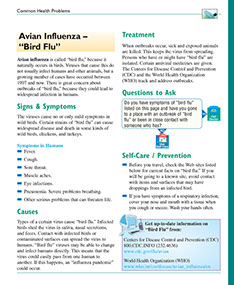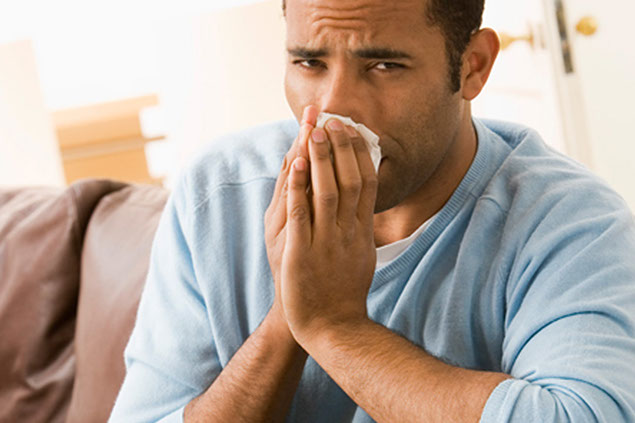CONDITIONS
SYMPTOM CHECKER
Male
Female
Child
Arm, Hand & Shoulder Concerns
Legs & Feet Concerns
Dental & Mouth Concerns
Ear & Nose
Eye Conditions
Head Conditions
Arm, Hand & Shoulder Concerns
Legs & Feet Concerns
Front
Back
Arm, Hand & Shoulder Concerns
Dental & Mouth Concerns
Ear & Nose
Eye Conditions
Head Conditions
Arm, Hand & Shoulder Concerns
Dental & Mouth Concerns
Ear & Nose
Eye Conditions
Head Conditions
Front
Back
Arm, Hand & Shoulder Concerns
Neck Links
Head & Neck Concerns
Arm, Hand & Shoulder Concerns
Neck Links
Head & Neck Concerns
Front
Back
Online Clinic
Wise Healthcare
Avian Influenza - "Bird Flu"
Print on Demand
Avian influenza is called “bird flu,” because it naturally occurs in birds. Viruses that cause this do not usually infect humans and other animals, but sporadic human infections with avian influenza have occurred. Outbreaks of “bird flu” could lead to widespread infection in humans.
Severe Acute Respiratory Syndrome
Signs & Symptoms
The viruses usually cause no or only mild symptoms in wild birds. Certain strains of “bird flu” can cause widespread disease and death in some kinds of wild birds, chickens, and turkeys.
Symptoms in Humans
Causes
Avian influenza A viruses cause “bird flu.” Infected birds shed the virus in saliva, nasal secretions, and feces. Contact with infected birds or contaminated surfaces can spread the virus to humans. “Bird flu” viruses may be able to change and infect humans directly. This means that the virus could easily pass from one human to another. If this happens, an “influenza pandemic” could occur.
Resources
Treatment
When outbreaks occur, sick and exposed animals are killed. This keeps the virus from spreading. Persons who test positive for or might have “bird flu” are isolated. Certain antiviral medicines are given. The Centers for Disease Control and Prevention (CDC) and the World Health Organization (WHO) track and address outbreaks.
Questions to Ask
Question 1
Do you have symptoms of “bird flu” listed on this page and have you gone to a place with an outbreak of “bird flu” or been in close contact with someone who has?
Call your doctor or health care provider and state the problem. He or she can decide what you should do.
Use Self-Care / Prevention:
You can probably take care of the problem yourself if you answered NO to all the questions. Use the “Self-Care” measures that are listed. Call your doctor if you don’t feel better soon, though. You may have some other problem.
Centers for Disease Control and Prevention (CDC)
800.CDC.INFO (232.4636)
World Health Organization (WHO)
Self-Care / Prevention
• Check the Web sites listed below for current facts and possible vaccines for “bird flu” viruses. Avoid direct or close contact with wild birds and infected domestic birds and their droppings.
• Take antiviral medicines, as prescribed.
• Eat properly cooked poultry.
This website is not meant to substitute for expert medical advice or treatment. Follow your doctor’s or health care provider’s advice if it differs from what is given in this guide.
The American Institute for Preventive Medicine (AIPM) is not responsible for the availability or content of external sites, nor does AIPM endorse them. Also, it is the responsibility of the user to examine the copyright and licensing restrictions of external pages and to secure all necessary permission.
The content on this website is proprietary. You may not modify, copy, reproduce, republish, upload, post, transmit, or distribute, in any manner, the material on the website without the written permission of AIPM.
2021 © American Institute for Preventive Medicine - All Rights Reserved. Disclaimer | www.HealthyLife.com

















































